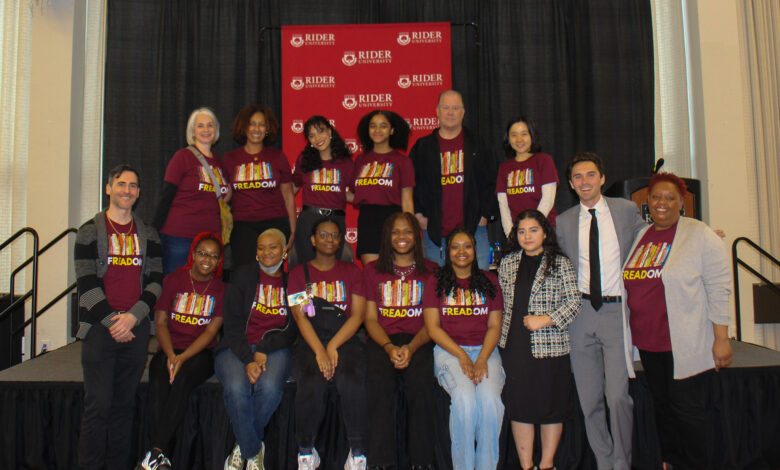
Panel shares how Gen Z can be activists
By Julia Train
Over 100 Rider students, faculty and staff sat scattered throughout the Bart Luedeke Center’s Cavalla Room to learn about activism, political power and Gen Z in a panel discussion featuring David Hogg, co-founder of March for Our Lives and Leaders We Deserve; Astead Herndon, a New York Times political reporter, and Rider alum Karla Lopez-Rosa, an immigrant rights activist.
Hosted on March 28, the event was co-sponsored by the Norm Brodsky College of Business and the College of Arts and Sciences in collaboration with Tapestry, as part of the 2024 Business of Media Lecture Series.
Tapestry is an initiative that engages Rider students in media learning and teaching opportunities that “recognize underserved populations and cultures.”
The event was moderated by Adam McMahon, an assistant professor of political science, and Aaliyah Shoulders, a junior film and television major.
A video by junior film and television major Faith Robinson-Hughes was used as an opener for the discussion, surrounding the history of activism within marginalized communities. Questions for the panelists were written beforehand by Shoulders and McMahon.
On the stage was Hogg and Lopez-Rosa ’23, who is now a Constituent Service Representative and Field Representative at the office of New Jersey Congresswoman Bonnie Watson Coleman. Herndon joined the discussion via Zoom.
The booking price for each guest is confidential, according to Juanita Carroll, Tapestry’s lead adviser and co-founder.
Hogg is also a New York Times bestselling author of “#NeverAgain: A New Generation Draws the Line,” a novel he co-wrote with his sister, Lauren Hogg, about their experiences of the 2018 tragedy at Marjory Stoneman Douglas High School. He was a senior and his sister was a freshman at the time of the school shooting in Parkland, Florida, which claimed 17 lives.
The event connected the three professionals’ specializations — political power, gun control and immigration — to share their perspectives on activism and Gen Z’s abilities.
“Our mission is to tell the stories of underrepresented populations … we want to hear those stories, we want to see how we can be advocates and allies,” said Carroll.
Hogg’s traumatic experience led him to advocate for gun control, co-founding March for Our Lives, alongside other students from his high school.
Six years after the original march, the youth-led movement has chapters throughout the country and holds rallies to demand change after other school shootings. The volunteers also work to file briefs in court cases and have helped to pass over 300 gun safety laws.
According to its website, March for Our Lives aims to create a world where gun violence is obsolete.
“We don’t have to agree on everything to make progress,” Hogg said, reflecting on what he’s learned while advocating for the issue.
On Zoom, Herndon spoke about his experiences covering Donald Trump’s rallies and challenges as a journalist in today’s political climate. He recalled colleagues being spat on and booed for remaining seated as they worked instead of standing up during the national anthem.
Herndon has been a journalist since 2015 working as a general assignment and city hall reporter at the Boston Globe and transitioned to political journalism when Trump became president.
“I’ve always been in the midst of that kind of crisis and in the midst of real structural challenges the country was facing … the biggest challenge for being a journalist is owning that role of responsibility and using it … we are constantly, in political reporting, pulled between ethical poles of dealing with respect, appearance, accuracy and trust,” he said.
Lopez-Rosa talked about her experience as a constituent service representative for Coleman, along with immigration’s impact on New Jersey and herself.
“Often, I have to remind myself why I’m doing it, why it matters and the people who are impacted at the end of the day,” Lopez-Rosa said.
Asha Burtin, a copyeditor, is a member of Tapestry and had no part in the writing or editing of this article.


